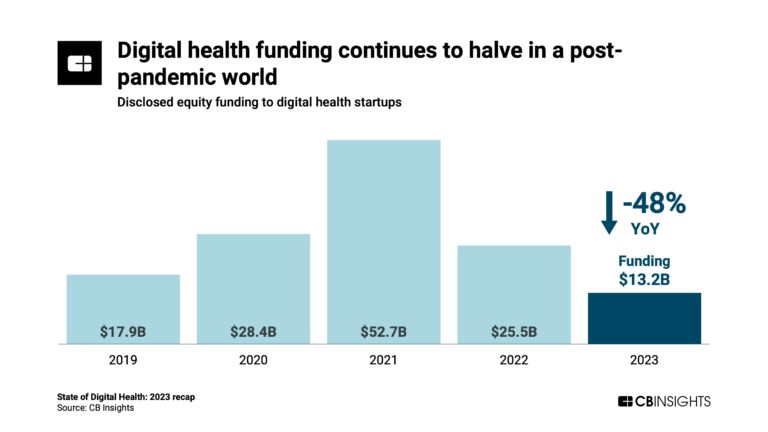Digital Health: more ideas, less money for startups
Global investors look for safer bets today, leaving less money on the table for other companies. But the market demand for innovation is still strong.

Is digital health still a thing? The question might seem stupid - of course the digitalization in Health sector is a key technological evolution - but it makes sense when considered from startups' point of view. Many neocompanies targeted the Health market with new solutions and services, but now there are less and less funding opportunities for them.
To better understand the digital heatlh scenario we have to take a few steps back. More precisely, back to 2020 and to the Covid-19 pandemic. Tech-wise, its only positive aspect is that it spurred and accelerated an impressive adoption of new technologies in very field. And Health sector was, of course, one of the most impacted.
So it wasn't exactly a surprise that digital health funding got to unprecedented levels in 2021. All over the globe. Since then, this funding dropped by 52% year-over-year in 2022 and 48% in 2023 (source: CB Insights). In 2023, digital health funding is estimated at 13.2 billion dollars globally, the lowest level since 2016.

Does this mean that, with the pandemic slowly disappearing in the rearview mirror, the Health sector isn't interested in new tech anymore? Apparently, this is not the case. But health organizations are now more interested in modernizing back-office systems and platforms, an evolution where startups can play a limited role. The biggest slice of this pie is traditionally in the hands of the big IT operators. In EU, this is true more than ever for the Resilience and Recovery funds.
Patients and their families, on the other hand, are more an more digital-focused. They're looking for new wellbeing and self-care apps, telemedicine and telemonitoring services, "serious" health wearables, even AR/VR solutions, and so on. The digital therapies green(ish)field is especially important today: a big percentage of patients - especially chronic ones - consider adopting DTx as a potentially life-changing experience.
It's the market
So, the issue here is not market demand but, it seems, a more punishing global investment landscape. Startups/scaleups must generate a meaningful return in a shorter time, and if they don't seem to be able to do it, investors gradually flee.
The digital healt investment market is therefore shrinking. And, more interestingly, concentrating. Investors spend less and make less deals, but are inclined to invest more in promising companies. In 2023, median equity deal size was at a record high of $4M in 2023, says CB Insights: an 8% increase over 2021. In the same period, generic global venture investments decreased 22%.

Also, the rise in deal size is particularly, and positively, pronounced among Europe-based startups. Good news, in a filed as unbalanced as digital health funding is: nearly 70% of 2023 investments favoured, predictably, US startups. Even if European startups are on the rise, their role on the global scene is still limited.

Francesco Pignatelli
Francesco Pignatelli began his love story with computers and technology at the age of 14, with his ZX81. This led to a career in software development and then in IT and tech journalism. He has spent more than 25 years covering a wide range of IT and tech topics - telecommunications, cyber security, software development, enterprise software, knowledge management - for many of the most important Italian business tech magazines. He is always looking for new digital stuff and still writes unreliable software.
Related news
Last News
RSA at Cybertech Europe 2024
Alaa Abdul Nabi, Vice President, Sales International at RSA presents the innovations the vendor brings to Cybertech as part of a passwordless vision for…
Italian Security Awards 2024: G11 Media honours the best of Italian cybersecurity
G11 Media's SecurityOpenLab magazine rewards excellence in cybersecurity: the best vendors based on user votes
How Austria is making its AI ecosystem grow
Always keeping an European perspective, Austria has developed a thriving AI ecosystem that now can attract talents and companies from other countries
Sparkle and Telsy test Quantum Key Distribution in practice
Successfully completing a Proof of Concept implementation in Athens, the two Italian companies prove that QKD can be easily implemented also in pre-existing…
Most read
Integral AI Unveils World’s First AGI-capable Model
#AGI--Integral AI, a global leader in the development of embodied AGI, today announced the successful testing of the world’s first AGI-capable model.…
Reply Achieves the AWS Agentic AI Specialization and Is Named an Implementation…
Reply [EXM, STAR: REY] announced that it has achieved the Amazon Web Services (AWS) Agentic AI Specialization, a new category within the AWS AI Competency.…
Tecnotree Emerges as CX Catalyst Winner for Impact at The Fast Mode Awards…
Tecnotree, a global digital platform and services leader for AI, 5G, and cloud-native technologies, has won the CX Catalyst award for Impact at The Fast…
CoMotion GLOBAL 2025 Launches in Riyadh: Global Mobility Leaders Unite…
Riyadh is rapidly becoming one of the world's most ambitious urban mobility laboratories, where next-generation technologies move from blueprint to real-world…






